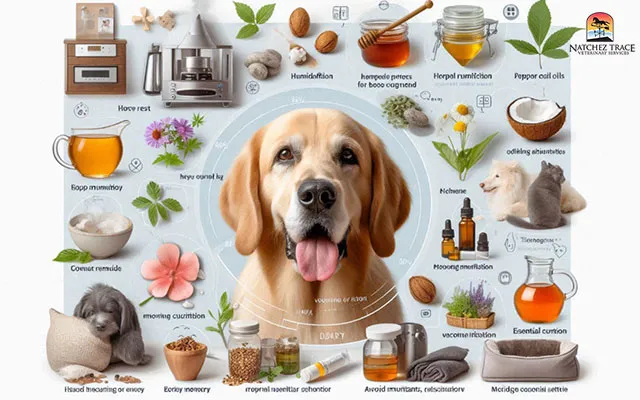If you’re seeking effective Home Remedies For Kennel Cough In Dogs, understanding this common respiratory condition and how to manage it is essential. Kennel cough, medically known as infectious tracheobronchitis, is a highly contagious respiratory infection that can affect dogs of all ages, causing a distinctive dry, honking cough. While some pet parents consider kennel cough vaccines, their effectiveness can vary, as highlighted by veterinary experts.
Similar to how the common cold or bronchitis spreads among humans, kennel cough can rapidly transmit in environments where dogs frequently gather, such as kennels, animal shelters, and dog parks. Equipping yourself with knowledge about the causes, symptoms, and proven home remedies for kennel cough in dogs can empower you to support your canine companion’s recovery and actively prevent the spread of this prevalent ailment within the dog community. This guide will walk you through everything you need to know, from identifying the condition to administering supportive care at home.
Causes of Kennel Cough
Kennel cough often stems from a combination of infectious agents, making it a complex condition. Understanding the primary culprits can help in prevention and treatment.
Bacteria
The leading bacterial cause of kennel cough is Bordetella bronchiseptica. This highly contagious bacterium spreads quickly among dogs, particularly in settings where they are in close contact, such as dog parks, grooming salons, and boarding facilities. Bordetella bronchiseptica adheres to the cilia lining the respiratory tract, triggering inflammation and the characteristic coughing symptoms. An infected dog can easily transmit the bacteria to other canines through direct interaction, sharing water bowls, or even via airborne droplets produced when coughing or sneezing.
Viruses
Beyond bacterial infections, several viruses contribute significantly to kennel cough. The canine parainfluenza virus is a common viral instigator. This virus causes inflammation of the upper respiratory tract, leaving dogs more vulnerable to secondary bacterial infections like Bordetella bronchiseptica. Symptoms of parainfluenza can include coughing, nasal discharge, and a mild fever. Canine adenovirus type 2 is another viral agent, primarily impacting the respiratory system and causing symptoms akin to kennel cough, such as a dry, hacking cough and nasal discharge. Although less prevalent due to widespread vaccination, the canine distemper virus can also lead to kennel cough, often accompanied by severe respiratory, gastrointestinal, and neurological issues, making prevention through vaccination critical.
Mixed Infections
Frequently, kennel cough results from a synergistic combination of both bacterial and viral infections. For instance, a dog might first contract a viral infection, such as canine parainfluenza, which compromises its immune system and creates an opportune environment for Bordetella bronchiseptica to establish itself. This interplay between viruses and bacteria intensifies symptom severity and extends the recovery period. Mixed infections can be particularly challenging to treat, often necessitating a combination of antiviral and antibacterial therapies to achieve full recovery.
Symptoms of Kennel Cough
Dogs suffering from kennel cough typically exhibit several distinct symptoms that pet owners should be aware of.
 Dog sneezing, a common symptom of kennel cough
Dog sneezing, a common symptom of kennel cough
The most common and defining sign is a persistent, dry, honking cough. This cough can often sound like your dog is trying to clear something from its throat or might resemble a goose honk.
In addition to this characteristic cough, dogs often display other symptoms such as:
- Gagging or retching: Dogs may gag or retch, sometimes expelling a foamy, white discharge, which can be mistaken for vomiting.
- Sneezing and runny nose: Some dogs may also experience sneezing and nasal discharge, indicating general upper respiratory irritation.
- Lethargy: Affected dogs might appear more tired or subdued than usual, showing a decrease in their typical energy levels.
- Loss of appetite: Discomfort or general malaise can lead some dogs to eat less, impacting their nutritional intake during recovery.
- Fever: In more severe instances, a mild fever may be present, signaling the body’s fight against the infection.
How Kennel Cough is Transmitted
Kennel cough is a highly contagious condition, and understanding its transmission pathways is crucial for effective prevention.
The primary modes of transmission include:
- Direct Contact: Dogs can contract kennel cough through direct interaction with an infected dog, such as during playtime or in crowded environments like dog parks and boarding kennels.
- Airborne Particles: The infection can spread through airborne droplets released when an infected dog coughs or sneezes, which can be inhaled by nearby dogs. This makes close quarters a high-risk setting.
- Contaminated Surfaces: Shared surfaces, including water bowls, food dishes, toys, and kennel floors, can harbor infectious agents. Healthy dogs coming into contact with these surfaces can then pick up the infection.
Understanding these transmission methods allows you to proactively safeguard your dog from kennel cough, especially in social settings where they may interact closely with other dogs.
Kennel Cough Risk Factors
Several factors can increase your dog’s susceptibility to contracting kennel cough. Being aware of these risks is paramount for protecting your pet’s health.
Below are some common risk factors:
 Dogs in crowded conditions, increasing kennel cough risk
Dogs in crowded conditions, increasing kennel cough risk
- Crowded Conditions: Environments with a high density of dogs, such as kennels, shelters, dog daycares, and dog parks, significantly elevate the risk of kennel cough spread. The close proximity of animals facilitates easy transmission of the infection from one dog to another.
- Stress: Stressful situations can compromise a dog’s immune system, making them more vulnerable to infections, including kennel cough. Stress can arise from changes in environment, disruptions to their routine, or exposure to unfamiliar dogs and new situations.
- Young, Elderly, or Immunocompromised Dogs: These groups are at a heightened risk for experiencing more severe symptoms due to their weaker or developing immune systems. Puppies, older dogs, and those with pre-existing health conditions are particularly susceptible to the complications associated with kennel cough.
By recognizing these risk factors, pet owners can implement proactive measures to minimize their dog’s exposure and bolster their overall health and resilience against infectious diseases.
Kennel Cough Home Treatment for Dogs
When your furry friend is battling kennel cough, several effective at-home treatments can significantly ease their symptoms and support a smoother recovery. While many mild cases of kennel cough resolve naturally, it’s vital for pet owners to closely monitor their dog’s condition and seek veterinary advice if symptoms persist or worsen. These home remedies for kennel cough in dogs focus on comfort, hydration, and immune support.
 Collage of effective home remedies for kennel cough in dogs
Collage of effective home remedies for kennel cough in dogs
Here are some proven at-home treatments for kennel cough:
Rest and Isolation
Rest is paramount for dogs suffering from kennel cough, as it allows their immune system to dedicate its energy to fighting off the infection. Ensure your dog has a quiet, comfortable, and undisturbed space where they can relax and recuperate. Adequate rest not only accelerates recovery but also minimizes the risk of secondary complications.
Equally important is isolation to prevent the further spread of kennel cough to other animals. Keep your infected dog separated from other pets and communal areas. This means temporarily avoiding dog parks, boarding facilities, and any social gatherings with other dogs until your dog has fully recovered and is no longer contagious. By prioritizing ample rest and strict isolation, you significantly contribute to your dog’s recovery while safeguarding the health of other animals.
Hydration
Maintaining proper hydration is crucial when your dog is ill with kennel cough. Water helps to thin mucus secretions in the respiratory tract, making it easier for your dog to clear its airways and breathe more comfortably. Encourage your dog to drink plenty of fresh water throughout the day to support overall hydration.
To entice your dog to drink more, consider offering low-sodium chicken or beef broth in addition to water. The savory flavor of the broth can make it more appealing, helping to ensure your dog consumes the necessary fluids to stay hydrated and support their recovery. Focusing on consistent hydration can significantly improve your dog’s comfort and accelerate their healing process from kennel cough.
Humidification
Proper humidification can greatly alleviate your dog’s kennel cough symptoms. An effective method is steam therapy: simply run a hot shower in a bathroom and allow your dog to sit in the steam-filled environment for 10-15 minutes. The warm, moist air helps to soothe your dog’s irritated throat and can aid in loosening and clearing mucus from its airways, providing relief from persistent coughing and discomfort.
Additionally, placing a humidifier in the room where your dog sleeps can help maintain a consistently moist environment. This continuous presence of humid air keeps the respiratory passages hydrated, reduces irritation, and promotes better overall respiratory health. By integrating these humidification techniques into your dog’s care, you can offer them substantial comfort and support during their recovery from kennel cough.
Honey
Honey can serve as a natural and soothing remedy for dogs experiencing kennel cough. A small amount, typically 1/2 to 1 teaspoon depending on your dog’s size, can help coat and soothe their throat, thereby reducing the frequency and severity of coughing. Honey’s natural anti-inflammatory and antiseptic properties provide relief from irritation and help calm the persistent cough associated with kennel cough.
However, it is crucial to exercise caution, especially with young dogs. Due to the potential risk of botulism, honey should not be given to puppies under one year old. Always ensure that the honey you use is pure, raw, and free from any additives or artificial ingredients. By safely incorporating honey into your dog’s care routine, you can offer a natural source of comfort and aid in their recovery from kennel cough.
Coconut Oil
Coconut oil is an excellent natural immune booster and can be a beneficial addition to the regimen of home remedies for kennel cough in dogs. Adding a small amount—approximately 1/2 teaspoon for small dogs and 1 teaspoon for larger dogs—to your dog’s food can provide numerous health advantages.
Coconut oil contains natural antibacterial and antiviral properties that can help bolster your dog’s immune system, making it more effective at fighting off infections. These properties make it a valuable supplement, especially during periods of illness. The medium-chain triglycerides (MCTs) found in coconut oil are known to enhance immune function, promoting overall health and increasing resilience against various infections. Including coconut oil in your dog’s daily diet can provide the essential immune support needed for recovery from kennel cough and for maintaining their long-term health.
Herbal Remedies
Herbal remedies offer a natural and supportive approach to your dog’s recovery from kennel cough. To prepare these remedies, purchase loose herbs and use a ratio of 1 tablespoon of herb per 1 cup of water. You can prepare several cups of tea at once and store it in the refrigerator for convenience. When serving, mix the herbal tea directly into each of your dog’s meals. For dosing, add 1/4 cup for small dogs, 1/2 cup for medium dogs, 3/4 cup for large dogs, and 1 cup for dogs weighing over 100 lbs.
- Licorice Root Tea: Licorice root is renowned for its anti-inflammatory and soothing properties. This makes it an excellent choice for easing throat irritation and reducing the coughing associated with kennel cough.
- Thyme: Thyme offers both antibiotic and antiviral properties, making it another beneficial herb for helping to combat the infection while supporting overall immune health.
Incorporating these herbal teas into your dog’s diet can provide additional natural support in their recovery process, complementing other treatments for kennel cough.
Essential Oils
Essential oils can serve as a supportive therapy for dogs with kennel cough, offering both topical and aromatic benefits. When considering essential oils as part of your home remedies for kennel cough in dogs, always ensure they are properly diluted and used safely to prevent any adverse reactions.
A highly recommended resource for using essential oils with pets is “SpOIL Your Pet” by Mia Frezzo, DVM. Dr. Frezzo, a doTERRA veterinary panel member, has extensive experience integrating essential oils into her veterinary practice.
For quality assurance, doTERRA is often preferred due to its stringent quality control and veterinary panel. However, other reputable suppliers like Young Living and AnimalEO are also used by veterinarians. The key is to select top-quality essential oils that are pure, free from additives, and extracted without harsh solvents, as low-quality oils can potentially cause more harm than good.
- Topical Application: For topical treatment, dilute one (1) drop each of doTERRA Breathe, Frankincense, and Lavender essential oils in 2 teaspoons of a carrier oil (such as fractionated coconut or olive oil). Apply this diluted mixture 2-4 times daily. To apply, place a few drops into your palms, rub them together, and then gently “pet” the oil onto your dog’s head, neck, and chest, carefully avoiding their eyes. This method can help soothe the respiratory system and provide a calming effect.
- Aromatic Use: Diffusing essential oils in your dog’s environment can also offer significant benefits. Use a diffuser with doTERRA On Guard, Breathe, and Frankincense essential oils for several hours during the day and at night, especially in the area where your dog rests. This practice helps purify the air, supports respiratory health, and fosters a calming atmosphere, aiding in your dog’s recovery.
Incorporating essential oils into your dog’s kennel cough treatment plan can enhance their overall comfort and support recovery by harnessing the natural therapeutic properties of these oils.
Proper Nutrition
Proper nutrition is fundamental for strengthening your dog’s immune system and supporting overall health, especially when they are recovering from kennel cough. Ensuring your dog receives the best nutrition during this time is a critical component of home remedies for kennel cough in dogs.
- Nutritious Diet: A well-balanced, high-quality diet is crucial for maintaining and boosting your dog’s immune system. Make sure their meals are rich in essential nutrients, including high-quality proteins, vitamins, and minerals, all vital for their immune function and overall well-being.
- Soft Foods: If your dog has a sore throat from constant coughing, offering soft foods can make eating significantly easier and more comfortable. You can soften their regular kibble by soaking it in warm water or low-sodium broth. This not only aids in swallowing but also contributes to their daily hydration.
- Home Cooking: For a more personalized approach, consider preparing home-cooked meals for your dog. Crafting an energetically appropriate diet, such as those recommended by Traditional Chinese Veterinary Medicine (TCVM), can provide an extra health advantage. Home-cooked meals allow you to control the ingredients, ensuring they are fresh, wholesome, and tailored to your dog’s specific needs during recovery. For comprehensive guidance on preparing such meals, consult resources like Dr. Smith’s Food Therapy page.
Implementing these nutritional strategies can significantly aid your dog’s recovery from kennel cough, providing them with the necessary support to strengthen their immune system and maintain optimal health.
Avoid Irritants
To support your dog’s recovery from kennel cough and minimize respiratory discomfort, it’s essential to reduce their exposure to potential environmental irritants. This is a crucial step in implementing effective home remedies for kennel cough in dogs.
- Smoke and Strong Odors: Protect your dog from exposure to cigarette smoke, harsh chemical cleaning products, aerosol sprays, and other strong odors. These irritants can exacerbate coughing and respiratory distress, significantly hindering your dog’s healing process.
- Collar Pressure: When walking or restraining your dog, opt for a harness instead of a traditional neck collar. Collars can exert direct pressure on the throat area, which can trigger painful coughing fits in dogs with kennel cough. Harnesses distribute pressure more evenly across the chest and shoulders, effectively reducing throat irritation and minimizing coughing episodes.
By proactively addressing and eliminating these environmental irritants, you can create a more comfortable and conducive healing environment for your dog.
Monitor and Consult
Closely monitoring your dog’s symptoms and maintaining open communication with your veterinarian are critical steps in effectively managing kennel cough. Even with the best home remedies for kennel cough in dogs, professional guidance is indispensable.
- Monitor Symptoms: Diligently track your dog’s symptoms, noting the frequency and severity of coughing, any changes in lethargy levels, appetite fluctuations, and nasal discharge. Pay close attention to any changes in behavior or breathing patterns. If symptoms worsen, if your dog develops difficulty breathing, or if the illness persists for more than a week, seek veterinary attention promptly.
- Veterinary Advice: Always inform your veterinarian about any new herbs, supplements, or over-the-counter remedies you are considering for your dog, especially if they are not explicitly mentioned in this guide. This is particularly important if your dog has any pre-existing health conditions or is currently on other medications. Your veterinarian can provide crucial guidance regarding the safety, appropriate dosage, and potential interactions of supplements, ensuring they effectively complement your dog’s overall treatment plan without causing harm.
While at-home treatments can significantly help manage mild to moderate cases of kennel cough, it is imperative to schedule an appointment with your veterinarian if your dog exhibits severe symptoms such as persistent difficulty breathing, extreme lethargy, or a complete loss of appetite.
If the home-care treatments listed above are insufficient, your veterinarian may prescribe professional medical interventions:
- Cough Suppressants: In certain cases, veterinarians may prescribe cough suppressants to alleviate discomfort and reduce the frequency of coughing.
- Antibiotics: If a secondary bacterial infection is suspected or confirmed, antibiotics, such as doxycycline, may be prescribed to target the specific bacterial strain.
- Anti-inflammatories: These medications may be used to reduce inflammation in the airways, helping to ease irritation and improve breathing.
How to Prevent Kennel Cough
Preventing kennel cough involves a multi-faceted approach combining vaccination, diligent hygiene practices, and strategic management of your dog’s environment. Taking proactive steps can significantly reduce your dog’s risk of contracting this contagious respiratory infection.
Vaccination
The Bordetella bronchiseptica vaccine is the most widely used vaccine for kennel cough prevention. It is available in injectable, intranasal, or oral forms. You should consult with your veterinarian to determine the most suitable form for your dog based on their lifestyle and health profile.
Some veterinarians, like Dr. Smith, express skepticism about the universal effectiveness of the Bordetella vaccine and may not recommend it as a standard core vaccine. However, many boarding facilities and dog daycares require proof of vaccination, so it’s often kept in stock to meet clients’ needs.
Hygiene and Sanitation
Regularly cleaning and disinfecting your dog’s living area, including their bedding, toys, and feeding bowls, is crucial to reduce the risk of infection. Maintaining a clean and sanitized environment helps minimize the presence of infectious agents that can cause kennel cough, breaking the chain of transmission.
Avoid Crowded Places
Limit your dog’s exposure to crowded environments such as busy dog parks, large boarding kennels, and bustling grooming salons, particularly during periods when kennel cough outbreaks are known to occur. These settings are hotspots for the rapid spread of respiratory infections due to the high concentration of dogs.
 Dogs interacting safely to prevent kennel coughManage Social Interactions
Dogs interacting safely to prevent kennel coughManage Social Interactions
Managing your dog’s social interactions is essential for preventing the spread of contagious diseases like kennel cough. It’s important to screen dogs your pet interacts with to ensure they are healthy and appropriately vaccinated, especially in settings like doggy daycare or training classes where multiple dogs gather. This precautionary measure significantly reduces the risk of exposure to infectious agents and helps maintain a safe environment for all dogs involved.
When introducing a new pet into your home, a temporary quarantine period from your existing pets is crucial until you can confirm it is free from respiratory infections. This isolation allows you to monitor the new pet for any signs of illness and effectively prevent the potential spread of diseases, including kennel cough, to your other beloved companions. By taking these proactive measures, you can minimize the risk of disease transmission and promote the health and well-being of all pets in your care.
Boost Your Dog’s Immune System
A robust immune system is your dog’s best defense against kennel cough, enabling them to effectively fight off infectious agents like bacteria and viruses. Maintaining a strong immune system through proper nutrition, regular exercise, and stress reduction can help your dog resist infections and recover quickly if exposed. Our preferred dog immune booster is PET | TAO Complement Immune, an all-natural supplement containing medicinal mushrooms and antioxidants.
Healthy Diet
Feeding your dog a well-balanced, nutritious diet is fundamental to supporting their immune system. For pet owners seeking a proactive approach, consider a Traditional Chinese Veterinary Medicine (TCVM) energetically appropriate diet. Eastern food therapy is known for its ability to boost a dog’s immune system and help manage chronic conditions. More detailed information and recipes can be found on specialized food therapy pages. A high-quality mushroom supplement, such as Complement Immune, can further enhance your dog’s immune defenses.
Regular Exercise
Regular exercise plays a vital role in enhancing your dog’s immune function. Physical activity stimulates the production of immune cells, such as white blood cells, which are essential for combating infections. Exercise also improves blood circulation, ensuring these immune cells are efficiently transported throughout the body to where they are needed most.
Furthermore, consistent exercise helps reduce stress levels in dogs by promoting the release of endorphins, which are natural mood lifters. Lower stress levels are directly linked to a stronger immune system, as chronic stress can suppress immune responses. Keeping your dog physically active not only improves their overall health and fitness but also fortifies their immune system, making them more resilient to illnesses like kennel cough.
Reduce Stress
Minimizing stress in dogs is critical for maintaining a robust immune system and overall health. Chronic stress triggers the release of stress hormones like cortisol, which can suppress the immune response over time. This suppression weakens the body’s ability to fight off infections, making dogs more susceptible to illnesses such as kennel cough.
To reduce stress in your dog, create a calm and predictable environment. Provide ample mental and physical stimulation through regular exercise and interactive play. Establishing a consistent daily routine with regular feeding times, walks, and play sessions can help alleviate anxiety and promote a sense of security.
Additionally, ensure your dog has a safe and comfortable space to retreat when feeling overwhelmed or stressed. This could be a quiet corner with their bed or crate, away from loud noises or unfamiliar situations. Utilizing positive reinforcement training techniques and calming aids like pheromone diffusers or calming supplements can also be beneficial in reducing anxiety levels.
By actively managing your dog’s stress levels, you not only improve their overall well-being but also strengthen their immune system, helping them remain healthy and resilient against infections like kennel cough.
Ventilation
 Good ventilation ensures fresh air for dogs, preventing kennel cough
Good ventilation ensures fresh air for dogs, preventing kennel cough
Ensuring good ventilation in areas where your dog spends time is essential for their health and well-being, especially as a preventive measure against kennel cough. Adequate airflow helps to dilute and disperse airborne pathogens, including those that can cause kennel cough. In indoor facilities such as kennels and grooming salons, where dogs are in close proximity, proper ventilation is particularly critical for minimizing the risk of infections spreading.
Good ventilation not only reduces the concentration of infectious particles but also helps maintain optimal air quality. Poor air quality can contribute to respiratory issues and exacerbate existing conditions. By improving airflow through ventilation systems, opening windows, or using fans, you can create a healthier environment for your dog, significantly reducing their exposure to respiratory irritants and pathogens.
Avoid Shared Items
Avoiding shared items like water bowls, toys, and bedding is a crucial strategy to reduce your dog’s risk of infections such as kennel cough. Sharing items, especially in public or communal places frequented by multiple dogs, can easily facilitate the transmission of pathogens between animals. Bacteria and viruses responsible for kennel cough can readily spread through saliva, nasal secretions, and even linger on surfaces.
To minimize this risk, always provide your dog with a designated water bowl, toys, and bedding that are not shared with other dogs. This practice helps prevent direct contact with potentially contaminated items. The risk of transmission is higher in public areas like dog parks, grooming facilities, or boarding kennels, where dogs from various households interact. Ensuring your dog has its own exclusive items significantly reduces exposure to infectious agents.
Regularly clean and disinfect your dog’s belongings, particularly if they have been in contact with other dogs or if an outbreak of kennel cough has been reported in your area. Use pet-safe cleaning products and wash bedding and toys frequently to maintain rigorous hygiene. Additionally, avoid allowing your dog to drink from communal water sources when out and about; instead, bring your own water supply.
Regular Veterinary Check-Ups
Regular veterinary check-ups are vital for monitoring your dog’s overall health and ensuring they are up-to-date on vaccinations and other essential preventive care. Early detection of any health issues can significantly improve treatment outcomes and help catch potential problems like kennel cough before they escalate.
Prompt Treatment
If your dog displays any signs of respiratory illness, it is imperative to seek veterinary care promptly. Early intervention can not only prevent the spread of infection to other dogs but also significantly reduce the severity and duration of the illness in your pet.
By diligently following the preventive measures outlined above, you can significantly reduce the risk of your dog contracting kennel cough and help ensure their overall health and well-being.
If you have any questions or require assistance with your dog’s health, please contact us today! We are always here to help.

 Dogs interacting safely to prevent kennel coughManage Social Interactions
Dogs interacting safely to prevent kennel coughManage Social Interactions